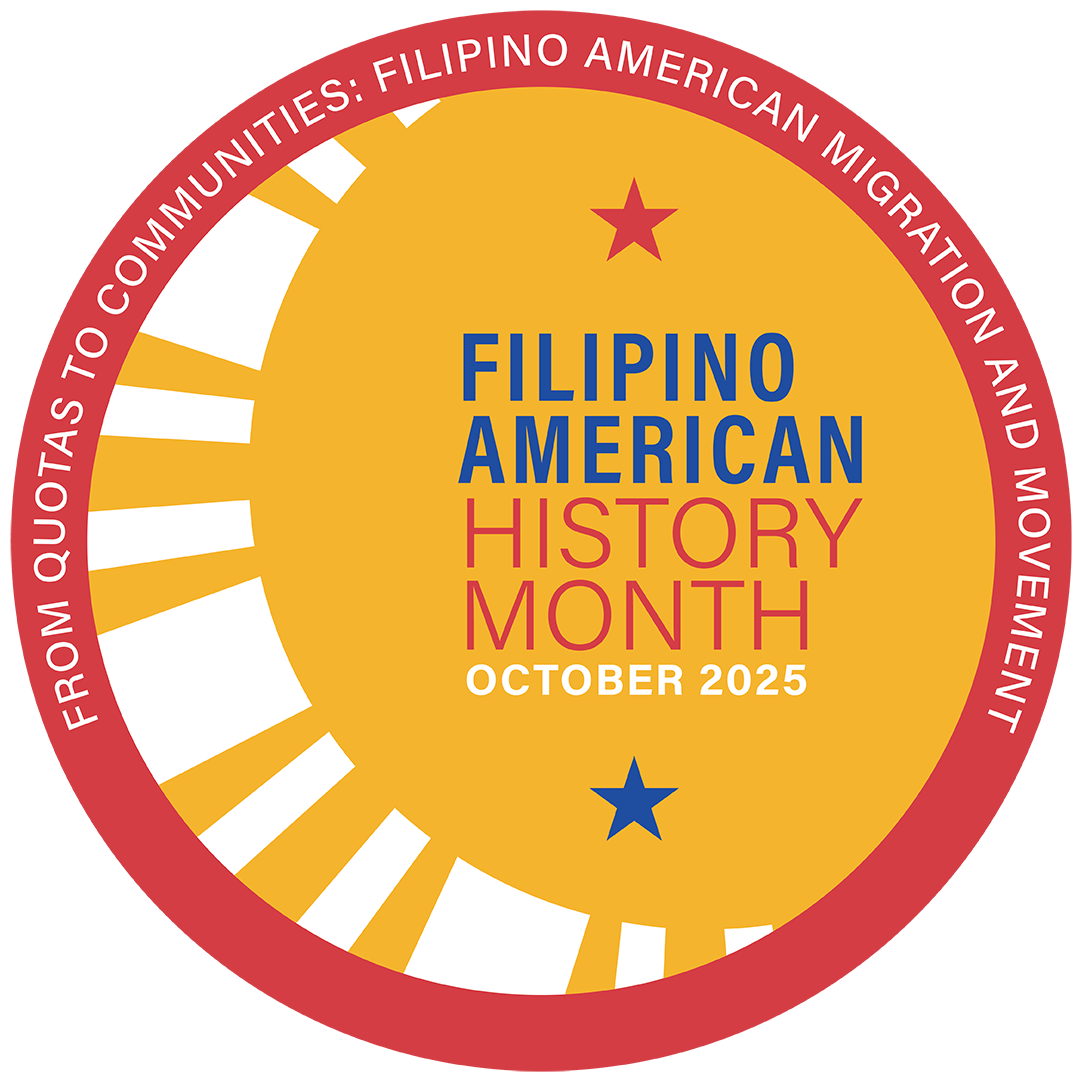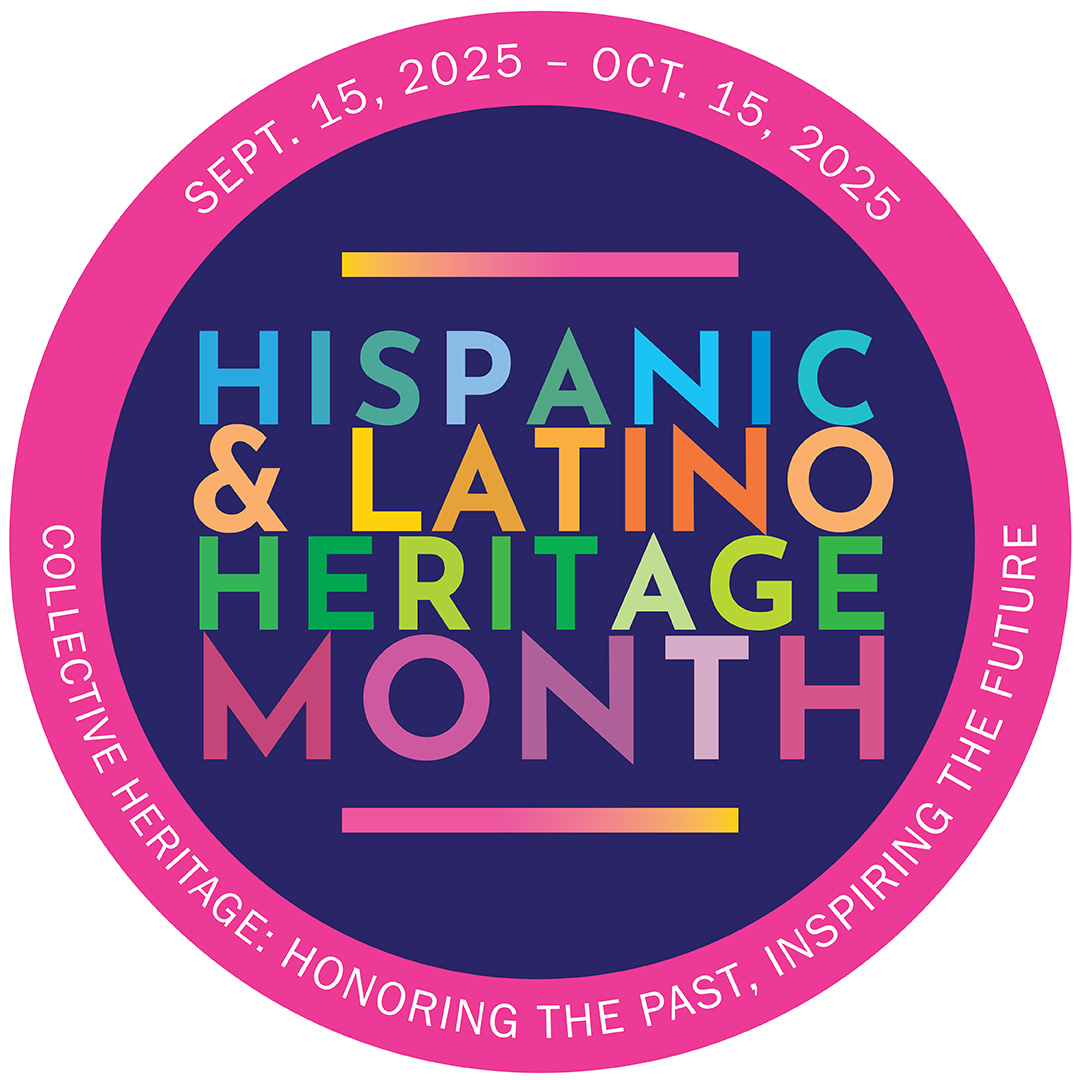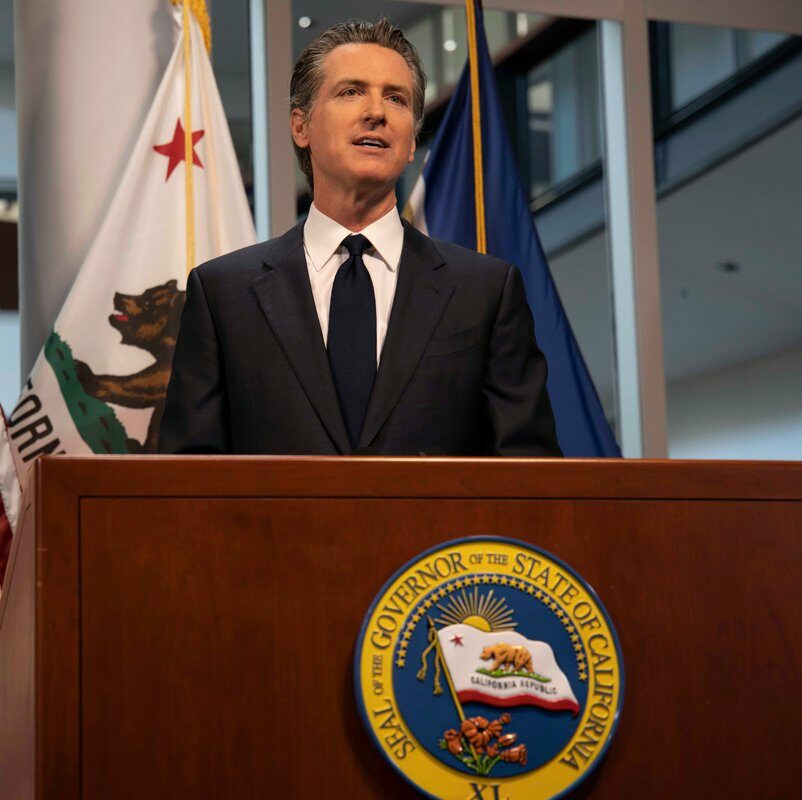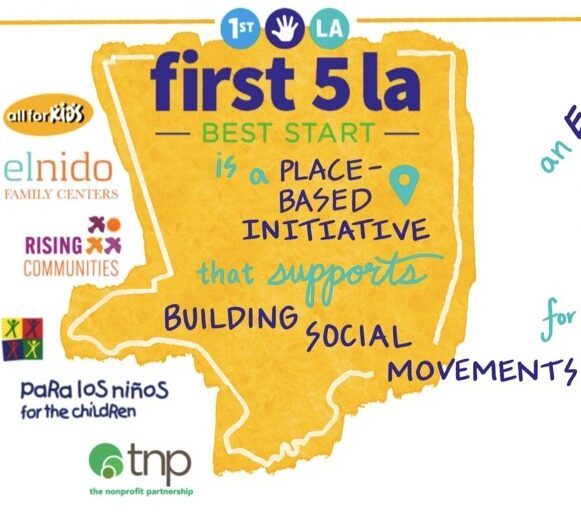By, Ruel Nolledo | Freelance Writer
November 19, 2025
Child care providers have long played an important role in combating food insecurity among children, with some providers reporting even spending out of pocket so that children in their care would have enough for lunch and snacks.
Despite this, providers remain underpaid and undervalued. That makes it all the more difficult for them to make ends meet while prioritizing quality care and healthy food for the children in their care, says Samantha Kay-Daleiden Marshall, policy and programs director of the CACFP Roundtable.
“One in four people in L.A. County experience food insecurity,” she says. “But what’s less known is that one in three child care providers across the nation are food insecure. That’s why access to a program like the Child and Adult Care Food Program (CACFP) can be a lifeline for children in child care, their families, and family child care providers themselves.”
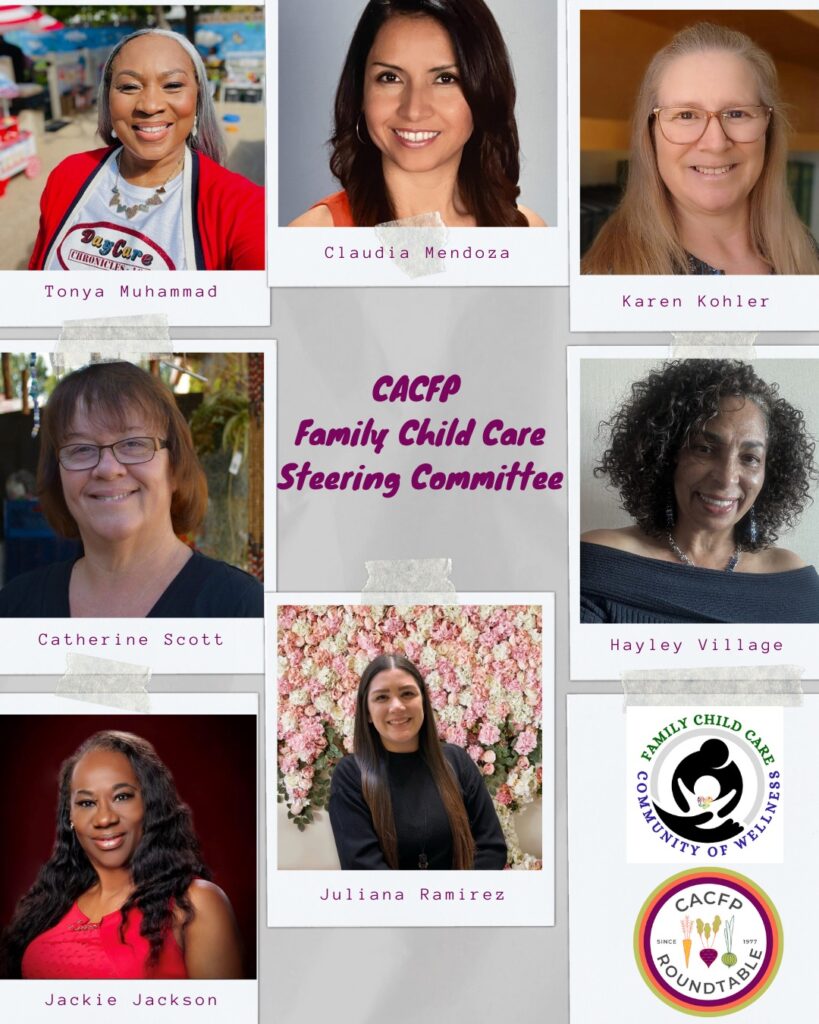 There’s just one problem: participation in the CACFP — a federal nutrition program that reimburses child care providers for serving healthy meals and snacks to participants — has been on the wane for over a decade. Data shows that, in California, more than 8 million fewer meals were served in family child-care homes between 2010 and 2017. Here in L.A. County, more than half of family child care providers who are eligible for the CACFP do not participate in the program, despite the many benefits available. In past studies, care providers cited a number of reasons for opting out of the CACFP, including burdensome administrative reviews, inadequate staff time, training needs and ongoing communication issues. It would take a lot of work to engage child care providers — not just in joining the CACFP but in changing it so that the program served them better.
There’s just one problem: participation in the CACFP — a federal nutrition program that reimburses child care providers for serving healthy meals and snacks to participants — has been on the wane for over a decade. Data shows that, in California, more than 8 million fewer meals were served in family child-care homes between 2010 and 2017. Here in L.A. County, more than half of family child care providers who are eligible for the CACFP do not participate in the program, despite the many benefits available. In past studies, care providers cited a number of reasons for opting out of the CACFP, including burdensome administrative reviews, inadequate staff time, training needs and ongoing communication issues. It would take a lot of work to engage child care providers — not just in joining the CACFP but in changing it so that the program served them better.
To help build out a viable solution to address these challenges, the CACFP Roundtable applied for a grant from First 5 LA’s Early Childhood Policy and Advocacy Fund (EC PAF). With that support, the CACFP Roundtable was able to carry through with its plan to team up with a small but dedicated group of family child care providers. Working together, they launched the Community of Wellness — a dedicated space where child care providers in Los Angeles and other parts of California could meet, offer each other support, advice and sometimes solace about the challenges of their profession and the ongoing difficulties in ensuring the children in their care had access to healthy (and delicious) food.
But that was just the beginning of the work.
A History of System Change
First 5 LA has long recognized that its most significant contributions have been accomplished by working with others — from public agencies and large-scale organizations to communities, caregivers and families. That commitment to partnership was front and center in the development of the first Community Opportunities Fund in 2008, and then later, the Policy Advocacy Fund (PAF). Both strategies focused on supporting the work of organizations working on systems and policy change that aligned with First 5 LA’s policy priorities. PAF later evolved into funding for three distinct areas — early learning, health, and the built environment.
By 2021, First 5 LA had recognized that a new approach was needed — one that integrated the different funding pools to advance equity, sustainability and systems change to address a range of policy areas. At the same time, the new approach should be capable of strengthening cross-sector collaboration.
After an extensive RFP process, First 5 LA selected Community Partners to work with them in developing a new kind of fund. With more than 30 years of experience working with grantmakers and government agencies to design, build and manage new projects and initiatives, the L.A.-based nonprofit would serve as the intermediary that would carry out the co-design process and implement the integrated First 5 LA Early Childhood Policy Advocacy Fund.
Centering Equity in the Process
In developing the new fund, the Community Partners team, led by Program Director Patti Sanchez and Senior Program Director Cynthia Freeman, worked to ensure equity was front and center. The team conducted interviews and held a series of listening and learning sessions. Several focus groups were conducted. The team also commissioned research on historic trends and entrenched racism in U.S. policymaking around issues impacting families and children.
“We did a lot of listening,” recalls Freeman. “We listened to former grantees and advocates. We held a focus group in Spanish with immigrant parents and another one for Black child care home providers.”
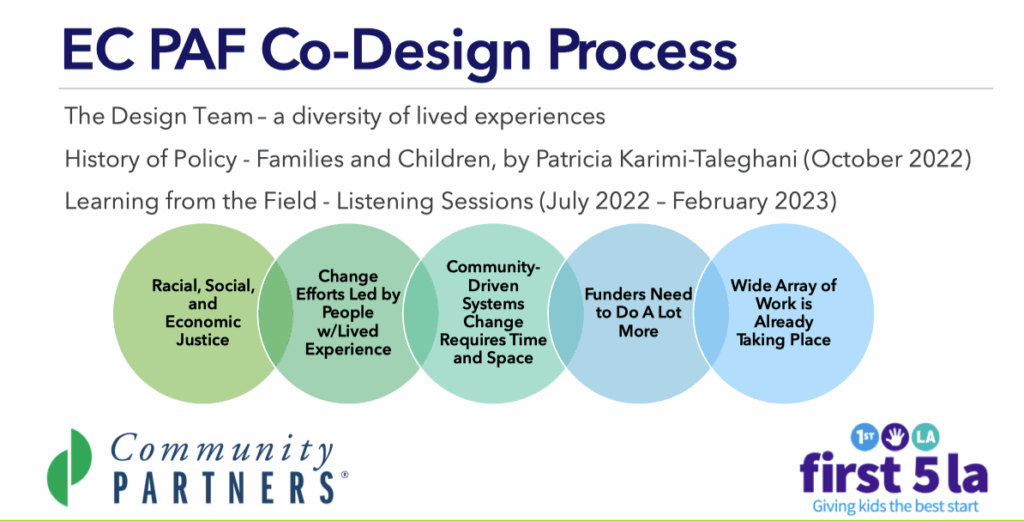
Throughout the entire process, the team prioritized learning from people and communities with lived experience, as well as expertise with the systems and supports that affect the well-being of families in and beyond LA County.
“We were really talking about systems change from a variety of perspectives,” recalls Sanchez. “We challenged ourselves all the time. All of us had ideas on how to center equity in the design of this grant, but actually operationalizing that was a lot more challenging than we thought.”
Freeman agrees, noting that the design process included plenty of external engagement. In addition to working with Dr. Pauline Brooks, a respected expert in racial justice and evaluation design (“She helped us second-guess ourselves about everything, which was really important,” says Freeman), the team also made sure to incorporate plenty of community feedback.
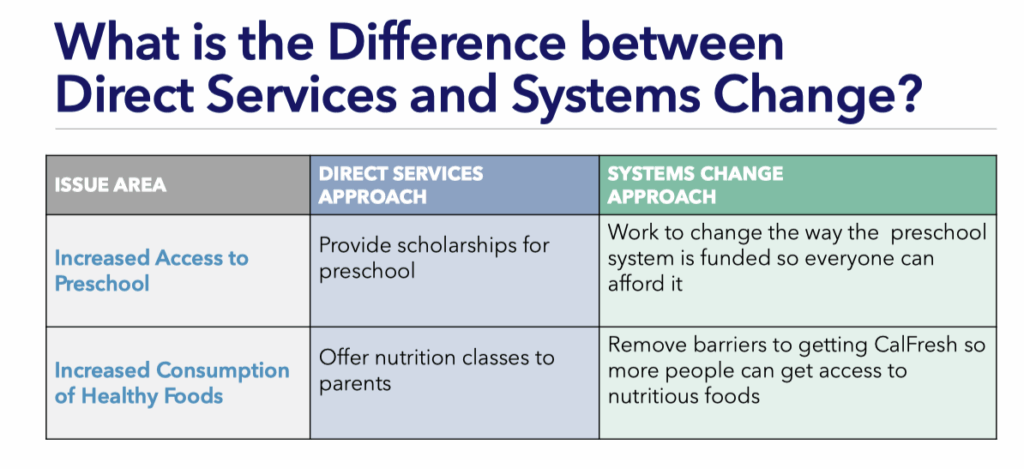
The hard work paid off with the launch of the new Early Childhood Policy and Advocacy Fund. Running from 2022 to 2027, the EC PAF strategy embodies a simple yet powerful idea: Empower the communities and families most impacted by the systems so that they can advocate for the changes needed.
“The EC PAF helps First 5 LA push public systems that shape early childhood toward equity and prevention,” explains First 5 LA Policy Analyst Erika Witt. “The goal is for these systems to advance belonging and justice for communities most impacted by inequities, make services more accessible, bring community voices into policy decisions, and align funding with a whole child, whole family approach.”
Change, Reimagined
One of the key features of the EC PAF was a two-pronged approach to systems change, one that provided more opportunities to bolster and support some of the great work that was already taking place throughout L.A. County. The first approach, the Reimagining Systems Fund (RSF), emphasizes support for nonprofits and fiscally sponsored organizations seeking to change the public systems most critical to children prenatal to 5 — think health care, early care and education, and housing, among others. Through multi-year grants ranging in size from $250,000 to $350,000, RSF supports various activities, such as agenda setting, policy or practice change and community mobilization. Priority is given to organizations that incorporate meaningful involvement and leadership in decision-making by community members negatively impacted by the systems they are advocating to reimagine.
RSF grantees have been hard at work over the last few years to advance First 5 LA’s goals across a number of areas. South L.A.-based Black Women for Wellness, for instance, worked with the California Department of Public Health on a study highlighting racial disparities in childbirth and co-sponsored state legislation that would improve outcomes for Black mothers and birthing persons. Another grantee, Catalyst California, successfully advocated for the passage of a Whole Child Equity Tool and is currently on the state implementation workgroup. Manuel Fierro, Catalyst California’s associate director of Early Childhood Policy, explains that the Tool is expected to be finalized later this year.
“We’re working to create a society rooted in racial and economic justice,” Fierro says. “The kind of society where all children are embraced, valued, and cared for — where every child has access to systems and services that promote their health, well-being, and the life opportunities that enable them to thrive.”
Like the RSF, the second EC PAF grant pool, the COFF, prioritizes systems change work. But where COFF shines is its emphasis on the community roots of that work —activities such as community engagement, storytelling and coalition-building — that make broader policy change possible. As a result, the COFF offers one year of funding for smaller applicants like grassroots nonprofits, fiscally sponsored projects, social benefits businesses, tribal entities, and even government agencies. All projects must take a whole child/whole family approach, with an emphasis on building community connections and elevating the voices of those with lived experiences.
The roster of COFF grantees reflects the Fund’s increased flexibility in supporting community-driven work, resulting in a mix of the new and familiar organizations working on issues that align with the objectives of First 5 LA’s 2024-2029 Strategic Plan. Past COFF grantees include the Los Angeles Neighborhood Land Trust, which worked with the LAUSD to promote school greening projects in South and Central Los Angeles; LA Walks, which developed a tool that helps community members learn how to advocate for safer streets; and Cielo, which educated public agencies on the importance of disaggregating data on Meso-American communities.
In the case of the CACFP Roundtable, another COFF grantee, Marshall says that the grant helped to build out its Community of Wellness into a convergence point for change. The community has become a space where providers not only share policy news and updates but also foster a spirit of working together to advocate for improvements to CACFP, fairer reimbursement rates, and more.
its Community of Wellness into a convergence point for change. The community has become a space where providers not only share policy news and updates but also foster a spirit of working together to advocate for improvements to CACFP, fairer reimbursement rates, and more.
That spirit was especially evident during a recent Community of Wellness meeting. When the guest speaker, a child care advocate and strategist, provided an update about new legislation to support the Child and Adult Care Food Program, one of the attendees quickly spoke up.
“We are strong, passionate women,” she said. “Tell us what to do.”
Adapting to Community Needs
The nature and work of policy change continue to evolve in response to new situations and challenges. In 2025, First 5 LA and Community Partners worked to highlight the flexible nature of COFF funding, especially in the context of the shifting political landscape and the emerging urgent needs in LA County. COFF grants can be used for systems change work that results in improved support for families affected by climate, environmental harm or emergencies; address recent policy changes impacting immigrant or mixed-status families; and engage in rapid response to changing federal policies and their local impact.
In November, First 5 LA and Community Partners unveiled the latest round of COFF grantees. Over the next year, the Fund will support the work of these eight organizations as they empower families and communities to create change in housing, health care, food insecurity and more.
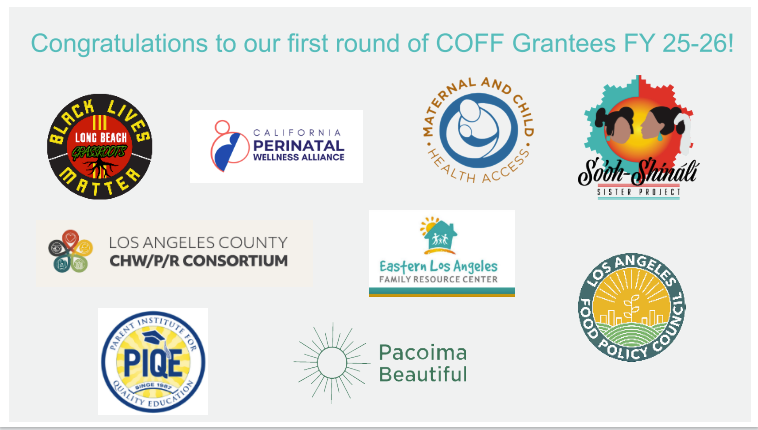
“These are the groups at the front lines,” she says. “And they are doing some really amazing work.”
###

